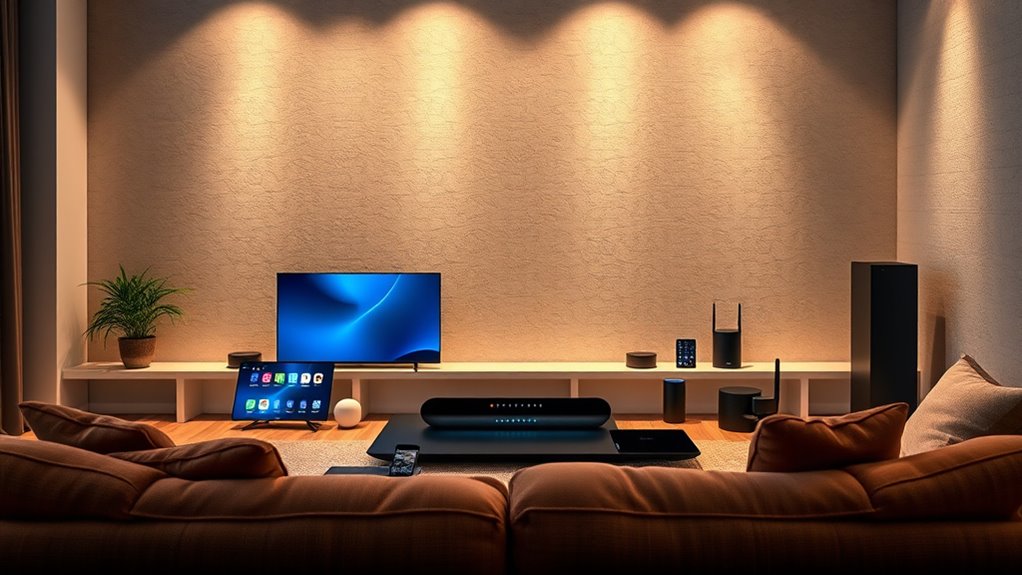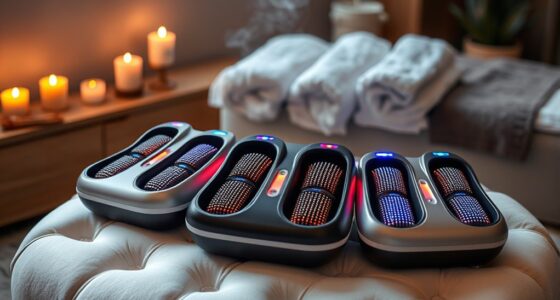If you’re looking to upgrade your smart home with the best, I recommend exploring top premium hubs like Samsung SmartThings, Hubitat Elevation, or Homey Bridge, which support multiple protocols, prioritize local processing, and future-proof compatibility like Matter. These hubs offer seamless device integration, robust security, and customizable automation features. If you’d like a thorough overview of the 15 best options to elevate your setup, keep going—there’s plenty more to discover.
Key Takeaways
- The list features high-end hubs supporting multiple protocols like Zigbee, Z-Wave, Wi-Fi, and Matter for comprehensive device integration.
- These premium hubs prioritize local data processing, security, and future-proof standards to enhance privacy and compatibility.
- They offer advanced automation, scene creation, and voice assistant support for personalized smart home control.
- Installation options include wired Ethernet, Wi-Fi, and plug-and-play setups tailored for tech-savvy users.
- Compatibility with a wide range of devices and open APIs enables extensive customization and seamless ecosystem expansion.
Aqara Smart Hub M2 for Home Automation
If you’re looking for a reliable and versatile home automation hub, the Aqara Smart Hub M2 stands out as an excellent choice. It connects via 2.4 GHz Wi-Fi and supports up to 128 Zigbee devices, including repeaters like LED strips and smart plugs. The hub features an Ethernet port for stable wired connections and USB power for flexible placement. It integrates seamlessly with Aqara devices and offers built-in security alerts, doorbell functions, and alarm capabilities. Plus, with 360° infrared control, you can manage IR devices like TVs and air conditioners effortlessly. Compatibility with Apple HomeKit, Google Assistant, and Alexa makes it a true smart home centerpiece.
Best For: smart home enthusiasts seeking a reliable, versatile hub that supports extensive Zigbee device integration, voice assistant compatibility, and comprehensive automation features.
Pros:
- Supports up to 128 Zigbee devices, including repeaters, for expansive smart home setups
- Seamless integration with Apple HomeKit, Google Assistant, and Amazon Alexa for versatile voice control
- Built-in security features like alerts, doorbell functions, and alarm system capabilities
Cons:
- Only compatible with Aqara Zigbee devices; does not support third-party Zigbee or Thread devices
- IR control is intended for indoor use only and may have limited range
- Requires 2.4 GHz Wi-Fi and wired Ethernet for optimal performance, which might limit placement options
SONOFF iHost Smart Home Hub, 4G Central Control Gateway
The SONOFF iHost Smart Home Hub stands out as an ideal choice for homeowners seeking maximum privacy and local control over their devices. It acts as a private local server, managing up to 128 Zigbee devices and supporting LAN connections, even during internet outages. With its robust RV1126 processor and 4GB DDR4 RAM, it delivers reliable performance. All data—scene logs, security details—are stored locally, ensuring privacy and security without cloud dependence. Plus, its open API and Docker support allow for custom integrations and add-ons, making it a versatile hub that keeps your smart home secure, private, and adaptable to your needs.
Best For: homeowners prioritizing maximum privacy, local control, and customizable smart home management without reliance on cloud services.
Pros:
- Supports up to 128 Zigbee devices and LAN connections, ensuring comprehensive coverage and control even during internet outages
- Stores all operational data locally, enhancing user privacy and data security without cloud dependency
- Compatible with open API and Docker, allowing tailored integrations and additional functionalities
Cons:
- Requires technical knowledge to set up and utilize open API and Docker features effectively
- Limited to 2000 entries per data type, which may be insufficient for very large or active smart home setups
- May be overkill for users seeking simple, plug-and-play smart home solutions
SmartThings Hub 3rd Generation Home Automation Hub
The SmartThings Hub 3rd Generation stands out for its extensive compatibility, making it an ideal choice for those seeking a versatile home automation solution. It supports Alexa, Google Home, Zigbee, Z-Wave, and cloud-to-cloud protocols, ensuring it works with a wide array of smart devices. I appreciate how it consolidates device control and monitoring into a single app, simplifying management. The hub enables automation based on triggers like door status or occupancy, enhancing convenience and security. Its seamless integration and broad compatibility make it a powerful centerpiece for any smart home, elevating your automation experience with ease and flexibility.
Best For: smart home enthusiasts seeking a highly compatible, centralized hub to seamlessly manage and automate various smart devices across multiple protocols.
Pros:
- Supports a wide range of protocols including Zigbee, Z-Wave, Alexa, and Google Home for versatile integration
- Simplifies device management by consolidating control into a single app
- Enables customizable automation based on triggers like door status or occupancy
Cons:
- May require additional setup or troubleshooting for complex automations
- Compatibility is limited to supported devices and protocols, potentially excluding some smart products
- Firmware updates and app stability can occasionally affect performance
Hubitat Elevation Home Automation Hub (Model C-8 Pro)
For homeowners who prioritize reliability and extensive device compatibility, the Hubitat Elevation Home Automation Hub (Model C-8 Pro) stands out as an excellent choice. It supports over 1,000 devices from more than 100 brands, including sensors, locks, thermostats, and switches, using protocols like Zigbee, Z-Wave, Wi-Fi, IR, and Matter. Its local processing guarantees fast, secure operation even during internet outages. The hub integrates seamlessly with voice assistants like Alexa, Google Home, and Apple HomeKit, while its advanced automation capabilities let me create customized scenes and routines. Although setup can be complex, its reliability and broad compatibility make it ideal for power users seeking a highly customizable smart home system.
Best For: homeowners and smart home enthusiasts seeking a highly customizable, reliable hub with extensive device compatibility and local control capabilities.
Pros:
- Supports over 1,000 devices across multiple brands and protocols for broad interoperability
- Ensures fast, secure operation with local processing even during internet outages
- Offers advanced automation, scene creation, and integration with voice assistants for personalized control
Cons:
- Setup can be complex and may require technical knowledge, especially for beginners
- User interface and mobile app can feel less intuitive and somewhat outdated
- Initial Z-Wave network setup may require troubleshooting, particularly with older devices
Homey Bridge Smart Home Hub
Looking for a smart home hub that effortlessly connects multiple protocols and simplifies automation? The Homey Bridge is exactly that. It supports Z-Wave Plus, Zigbee, Wi-Fi, BLE, and Infrared, making it compatible with a wide range of devices and voice assistants like Alexa and Google Home. You can create custom routines, such as playing music when you arrive or adjusting lights with a tap. Plus, it prioritizes your privacy with a privacy-by-design approach. The included 3-month Homey Premium subscription accesses unlimited device connections and insights, making this hub a powerful, secure, and user-friendly choice for elevating your smart home experience.
Best For: smart homeowners seeking a versatile, privacy-conscious hub that seamlessly integrates multiple protocols and simplifies automation.
Pros:
- Supports a wide range of protocols including Z-Wave Plus, Zigbee, Wi-Fi, BLE, and Infrared for extensive device compatibility
- Enables custom automation routines and voice control with Alexa and Google Home integrations
- Prioritizes user privacy with a privacy-by-design approach and no data sharing without consent
Cons:
- Requires a Homey Premium subscription ($2.99/month after the trial for more than five devices) for expanded device connections
- Compatibility verification needed via the Homey App Store for specific devices
- Some advanced features may require additional setup or integration steps
Homey Pro Smart Home Hub for Automation
Homey Pro stands out as an ideal choice for advanced smart home enthusiasts who want seamless integration across a vast array of devices. It supports over 50,000 gadgets from more than 1,000 brands, including popular names like Sonos, Philips Hue, and LG. With seven built-in protocols—Wi-Fi, Zigbee, Z-Wave, Infrared, BLE, Matter, and Thread—it offers unmatched flexibility and device compatibility. The open platform allows easy addition of new devices through official and community apps. All processing happens locally, ensuring privacy and low latency. Whether managing automation or monitoring energy, Homey Pro provides a powerful, future-proof hub for elevating your smart home experience.
Best For: smart home enthusiasts seeking extensive device compatibility, advanced automation capabilities, and local processing for privacy and low latency.
Pros:
- Supports over 50,000 devices from more than 1,000 brands, ensuring broad ecosystem integration
- Features seven integrated protocols—Wi-Fi, Zigbee, Z-Wave, Infrared, BLE, Matter, and Thread—for unmatched device flexibility
- Processes all data locally, enhancing privacy, reducing latency, and minimizing reliance on cloud services
Cons:
- May have a steeper learning curve for beginners due to its advanced features and customization options
- The extensive device support can sometimes lead to complex setup or troubleshooting processes
- Higher cost compared to simpler or less feature-rich smart home hubs
Philips Hue Bridge Smart Lighting Hub
The Philips Hue Bridge Smart Lighting Hub stands out as the ideal choice for homeowners seeking a reliable and feature-rich control center for their smart lighting system. It includes a single hub that releases full system capabilities like automations, remote control, multi-room setups, zones, and compatibility with voice assistants and Matter. Using Zigbee technology, it provides a secure, stable connection that minimizes Wi-Fi strain and keeps lights functioning during outages. With support for up to 50 lights and accessories indoors and outdoors, plus out-of-home control via the Hue app, it’s a versatile, future-proof solution that updates automatically and enhances your entertainment experience.
Best For: homeowners seeking a reliable, feature-rich smart lighting control hub that supports extensive customization, remote access, and future compatibility with evolving smart home standards.
Pros:
- Secure, stable Zigbee connection that reduces Wi-Fi congestion and maintains operation during outages
- Supports control of up to 50 lights and accessories indoors and outdoors, with out-of-home access via the Hue app
- Automatically receives updates, ensuring compatibility with new standards like Matter and ongoing system improvements
Cons:
- Requires additional components like HDMI Sync Box for media synchronization and surround lighting features
- Limited to Hue-compatible lights and accessories; incompatible with non-Hue devices without additional integrations
- Initial setup may be complex for users unfamiliar with smart home systems
Kasa Smart Plug HS103P4, Wi-Fi Outlet, 4-Pack
If you want a reliable, easy-to-use smart plug that doesn’t require a hub, the Kasa Smart Plug HS103P4 4-pack is an excellent choice. It supports 15 amps and connects directly to your Wi-Fi network, making setup simple with the Kasa app. Compatible with Alexa, Google Assistant, and IFTTT, it offers seamless voice control and remote management from anywhere. You can schedule timers or control appliances manually, whether you’re home or away. With UL certification for safety and a trusted reputation in Silicon Valley, this pack provides a cost-effective way to automate multiple devices effortlessly.
Best For: homeowners and renters seeking a reliable, easy-to-use smart plug for remote control and automation without the need for a hub.
Pros:
- Easy setup with the Kasa app and Wi-Fi connection
- Compatible with Alexa, Google Assistant, and IFTTT for voice control
- UL certified for safety and supports 15 amps for multiple devices
Cons:
- Requires 2.4GHz Wi-Fi network, not compatible with 5GHz
- Limited to Wi-Fi connectivity; no additional smart home protocols like Zigbee or Z-Wave
- The 4-pack may be more than needed for small-scale setups, potentially increasing cost for minimal use
MOES ZigBee 3.0 Hub/Wired Gateway for Smart Home
For those seeking a reliable ZigBee hub that seamlessly integrates with TUYA-compatible devices, the MOES ZigBee 3.0 Hub/Wired Gateway stands out as a solid choice. It’s compact, easy to set up, and covers over 200 meters, making it ideal for large homes. Connecting via Ethernet or WiFi, it supports controlling smart switches, lights, sensors, and motorized shades. While it offers stable connectivity and remote access, it’s primarily designed for MOES-specific ZigBee devices, limiting interoperability. The device’s bright LEDs and Chinese interface might be a drawback, but overall, it’s a dependable hub for expanding TUYA ecosystems, especially for those willing to work within its ecosystem limitations.
Best For: those looking for a reliable, TUYA-compatible ZigBee hub that covers large areas and integrates smart switches, lights, and sensors with stable connectivity.
Pros:
- Easy setup with stable, reliable connectivity over 200 meters
- Supports remote access via Ethernet or WiFi for flexible placement
- Compact design with USB power input suitable for various home environments
Cons:
- Limited to MOES-specific ZigBee devices, reducing interoperability with standard ZigBee products
- Interface only in Chinese, which may hinder usability for non-Chinese speakers
- Bright LED indicators cannot be turned off, potentially distracting in dark rooms
Mini Gateway Smart Gateway Remote Control with Micro USB Port
Designed for seamless smart home control, the Mini Gateway Smart Gateway Remote Control with Micro USB Port stands out with its compact size and user-friendly features. Its professional design includes two LED indicators and a reset button, making setup and operation straightforward. Made from durable UV-resistant ABS plastic, it’s built to last without fading or wear. The USB port allows easy charging, consuming little power and generating minimal heat. Supporting up to 128 devices, it ensures secure, reliable Bluetooth connections with strong wall penetration and anti-interference capabilities. It’s the perfect small, efficient hub for managing your smart home devices effortlessly.
Best For: smart home enthusiasts seeking a compact, reliable Bluetooth hub to manage multiple devices securely and effortlessly.
Pros:
- Supports connection of up to 128 Bluetooth devices for extensive smart home integration
- Compact and lightweight design with user-friendly features like LED indicators and reset button
- Durable UV-resistant ABS plastic construction ensures longevity and resistance to fading
Cons:
- Customer ratings are moderate, indicating potential room for improvement in user experience
- Limited to Bluetooth device management, not compatible with other smart home protocols
- No built-in batteries; requires continuous USB power supply for operation
Leviton Decora Smart Dimmer Z-Wave 800 Series, ZW6HD-1RW
The Leviton Decora Smart Dimmer Z-Wave 800 Series, ZW6HD-1RW, stands out as an ideal choice for those seeking reliable, advanced lighting control within their smart home. It’s Z-Wave Plus certified, offering enhanced performance, SmartStart enrollment, S2 security, and over-the-air updates. This dimmer supports full-range dimming for various bulbs, allowing you to create perfect ambiance for any occasion. Its compatibility with multiple control locations, including single pole and 3-way setups, makes installation flexible. Plus, it prevents flickering and offers customizable fade rates for smooth lighting progressions, all while seamlessly integrating into your existing smart home system.
Best For: smart homeowners seeking reliable, customizable, and seamless lighting control with advanced features and compatibility.
Pros:
- Z-Wave Plus certification ensures enhanced reliability, security, and over-the-air updates.
- Supports full-range dimming for various bulb types, allowing versatile ambiance creation.
- Compatible with multiple control setups, including single pole and 3-Way configurations, for flexible installation.
Cons:
- Requires a Z-Wave hub for remote access and automation, adding to setup complexity and cost.
- Fine-tuning settings may be necessary to prevent flickering with certain bulb types.
- Installation may be more complex compared to standard switches, especially in multi-location setups.
Smart Home Volume Controller
If you’re looking to fine-tune your home audio setup effortlessly, the Smart Home Volume Controller offers precise control with five adjustable volume levels and dual-channel stereo management. Its simple buttons make volume adjustments quick and intuitive, while supporting two speakers simultaneously enhances your audio experience. Made from durable ABS with a sleek, transparent design, it’s both sturdy and attractive. Compact and lightweight, it’s easy to install and suitable for various settings like background music or audio tuning. Whether updating a single room or a whole-home system, this controller provides reliable, seamless volume control that elevates your smart home environment.
Best For: those seeking a straightforward, reliable, and stylish volume control solution for multiple rooms or audio zones in their smart home.
Pros:
- Supports five adjustable volume levels for precise tuning.
- Dual-channel stereo control allows simultaneous management of two speakers.
- Durable ABS material combined with a sleek transparent design for aesthetic appeal.
Cons:
- Limited to two speakers; not suitable for multi-zone audio setups.
- May require technical knowledge for installation in some smart home configurations.
- Price and availability can vary depending on the retailer and location.
Lockin Wi-Fi Gateway and Electronic Lock Component for Smart Lock and Wireless Lock Box
Lockin Wi-Fi Gateway and Electronic Lock Components stand out for their seamless compatibility with a variety of smart locks, making them ideal for homeowners seeking reliable remote access and enhanced security. They support devices like Q3/Q1 Smart Door Knob and L1 Smart Box, ensuring stable, reliable connections—though not compatible with Lockin Veno series locks. Setup is quick: just plug in and connect via the app within two minutes, with a recommended distance of under 10 feet. The app allows remote control, access management, and real-time status updates, giving me peace of mind and complete control over my home’s security from anywhere.
Best For: homeowners and property managers seeking reliable, easy-to-install remote access and security management for compatible smart locks.
Pros:
- Supports multiple compatible smart lock devices for versatile use
- Easy setup within 2 minutes with a simple plug-and-play design
- Enables remote control, access management, and real-time status updates via app
Cons:
- Not compatible with Lockin Veno series locks
- Recommended door lock-to-gateway distance is under 10 feet for optimal performance
- Limited to Wi-Fi connectivity, may not suit areas with poor Wi-Fi signal
Yale Assure Lock 2 Plus with Apple Home Keys (YRD450-N-BLE-0BP)
For Apple users seeking seamless, keyless entry, the Yale Assure Lock 2 Plus with Apple Home Keys offers an innovative solution that combines convenience and security. It allows quick access by tapping your iPhone XS or later or Apple Watch Series 4 or later, with Home Keys stored in Apple Wallet for faster *unfastening*. The lock integrates with Apple HomeKit for Siri control, automations, and voice commands. Featuring auto-*unlatching*, DoorSense technology, a keypad, and a sleek Oil Rubbed Bronze finish, it’s designed for easy installation and daily use. While remote access requires an extra Wi-Fi module, the lock’s intuitive features make it a standout choice for Apple-centric smart homes.
Best For: Apple users seeking a seamless, keyless entry system that integrates effortlessly with their smart home ecosystem and offers quick, secure access with minimal fuss.
Pros:
- Easy installation and seamless integration with Apple HomeKit, Siri, and automations
- Convenient tap-to-unlock via iPhone or Apple Watch with Home Keys stored in Apple Wallet
- Sleek design with a durable Oil Rubbed Bronze finish and multiple security features like DoorSense and Auto-Unlock
Cons:
- No physical key backup, potentially problematic during electronic or battery failures
- Additional cost for remote access requires purchasing the Yale Wi-Fi Smart Module separately
- Reports of motor malfunctions and DoorSense failures after extended use, leading to potential lockouts
Kasa Smart Light Switch HS200, Single Pole, Needs Neutral Wire
The Kasa Smart Light Switch HS200 stands out as an excellent choice for homeowners who want a reliable, easy-to-install smart switch that requires neutral wiring. It’s a single-pole switch compatible with most standard wiring setups, supporting control via a smartphone app, voice assistants like Alexa and Google Assistant, and scheduling features. Designed for 100-120 VAC, it handles up to 15 A, making it suitable for controlling lights, fans, and fixtures. Installation is straightforward if you have basic electrical knowledge, but a neutral wire is essential. Overall, it offers a solid, budget-friendly way to add smart functionality to your existing lighting setup.
Best For: homeowners seeking a reliable, easy-to-install smart switch that requires neutral wiring and offers convenient control via smartphone and voice assistants.
Pros:
- Easy installation process for those with basic electrical knowledge
- Compatible with Alexa and Google Assistant for voice control and automation
- Supports scheduling and remote control for enhanced convenience and security
Cons:
- Requires a neutral wire, limiting compatibility in older homes without one
- Lacks dimming functionality, which may be a drawback for some users
- Native app can be buggy and lacks advanced features like device grouping and macros
Factors to Consider When Choosing Premium Home Automation Hubs

Choosing the right premium home automation hub means considering several key factors. I look at protocol compatibility, security, device support, and how easy it is to customize and install. Understanding these points helps guarantee I pick a hub that fits my needs perfectly.
Protocol Compatibility and Range
Selecting a premium home automation hub requires careful attention to protocol compatibility and range to guarantee seamless device integration and reliable connectivity. I look for hubs that support multiple protocols like Zigbee, Z-Wave, Wi-Fi, and Thread, ensuring I can connect devices from various brands and ecosystems without issues. I also consider the hub’s wireless range and signal strength, especially in larger or complex homes, to maintain stable connections throughout. Mesh networking capabilities are a plus, as they help extend coverage by allowing devices to relay signals without extra hardware. I verify whether the hub supports both indoor and outdoor devices, considering environmental factors. Lastly, I check if firmware updates improve protocol support and range, keeping my system performing at its best over time.
Privacy and Data Security
Ensuring privacy and data security is essential when choosing a premium home automation hub, especially since these devices handle sensitive information about your daily routines and personal environment. I look for hubs that process and store data locally, minimizing unnecessary sharing with third parties. End-to-end encryption is fundamental to protect communication between the hub and connected devices from interception. Support for open protocols like Zigbee, Z-Wave, or Matter helps reduce reliance on cloud services, boosting security through decentralized management. Regular firmware updates are critical to patch vulnerabilities and maintain system integrity. Additionally, secure hubs should offer user authentication methods, such as two-factor authentication or biometrics, to prevent unauthorized access. Prioritizing these features ensures my smart home remains private and protected from potential threats.
Device Ecosystem Support
A home automation hub’s ability to support a wide range of device ecosystems is crucial for creating a flexible and future-proof smart home. I look for hubs that support Zigbee, Z-Wave, Wi-Fi, and proprietary protocols to guarantee broad compatibility. Compatibility with voice assistants like Alexa, Google Assistant, and Apple HomeKit makes controlling my devices seamless. Support for emerging standards like Matter guarantees my setup stays current and interoperable across different ecosystems. I also value the ability to connect with various brands and product types to avoid vendor lock-in and expand my automation options. Ultimately, open APIs and support for third-party platforms allow me to customize and integrate new devices easily, giving my smart home the flexibility I need today and tomorrow.
Automation and Customization
Once a home automation hub supports a wide range of device protocols and ecosystems, my focus shifts to how well it enables me to tailor my smart home experience through automation and customization. Advanced hubs offer customizable routines and complex automation logic, giving me precise control over devices and scenarios. Visual programming interfaces like “if-this-then-that” rules or flow-based editors make creating automations simple and intuitive. Compatibility with protocols such as Zigbee, Z-Wave, Wi-Fi, Bluetooth, and Matter allows me to integrate diverse devices seamlessly. Firmware updates and open APIs are essential, as they let me add new features or modify existing automations to match my preferences. With flexible options like scheduling, event triggers, and scene creation, I can craft a truly personalized, automated home environment.
Installation Complexity
Choosing the right home automation hub involves considering how complex its installation process will be, since some setups are straightforward while others demand more technical skills. Simple, plug-and-play models often feature guided app-based setups, making installation quick and user-friendly. On the other hand, hubs supporting wired connections like Ethernet or requiring neutral wires tend to be more involved, needing advanced electrical work and configuration. Additionally, hubs with extensive protocol support—such as Z-Wave, Zigbee, Wi-Fi, or IR—may require extra steps for device pairing and network setup. Features like external antennas, multiple connection ports, or proprietary hardware can further complicate installation and extend setup time. Evaluating your technical comfort level and the complexity of your existing infrastructure is key to choosing a hub that fits your needs.
Future-Proof Features
To guarantee your home automation system remains relevant for years to come, look for hubs that support emerging standards like Matter, which assures compatibility with new devices and ecosystems. These hubs also benefit from regular firmware updates that add features, enhance security, and fix bugs, extending their lifespan. Multi-protocol support—such as Zigbee, Z-Wave, Wi-Fi, Bluetooth, and Infrared—helps your hub adapt to evolving communication technologies. Compatibility with voice assistants and integration platforms allows seamless control as these ecosystems grow and change. Additionally, modular designs or open APIs enable customization and integration of new functionalities, keeping your system flexible and future-ready. Prioritizing these features guarantees your smart home remains adaptable and prepared for upcoming innovations.
Frequently Asked Questions
How Do Different Hubs Ensure Compatibility With Various Smart Home Devices?
Different hubs guarantee compatibility by supporting multiple protocols like Zigbee, Z-Wave, and Wi-Fi, allowing them to connect with various smart devices. I check the hub’s specifications to confirm it works with my existing gadgets. Many hubs also have built-in or downloadable integrations, making it easier to add new devices. By choosing a hub with broad protocol support, I ensure my smart home remains flexible and future-proof.
What Security Features Are Essential in Premium Home Automation Hubs?
Think of a premium home automation hub as a fortress guarding your digital castle. Essential security features include robust encryption to shield your data, multi-factor authentication to prevent unauthorized access, and automatic firmware updates that patch vulnerabilities. I always look for hubs with intrusion detection and secure cloud backups. These features work together like a well-trained guard dog, ensuring my smart home stays safe and sound from cyber threats.
Can These Hubs Integrate With Voice Assistants Like Alexa or Google Assistant?
Yes, these hubs easily integrate with voice assistants like Alexa and Google Assistant. I love how I can control my entire smart home just by speaking commands. Most premium hubs support seamless voice integration, allowing me to manage devices, adjust settings, and automate routines effortlessly. This compatibility truly elevates my smart home experience, making everything more intuitive and hands-free.
How Do You Update and Maintain Firmware on High-End Automation Hubs?
Updating and maintaining firmware on high-end automation hubs is straightforward. I regularly check for updates through the hub’s app or web interface, which often prompts me when new firmware is available. I follow the simple on-screen instructions to download and install updates, ensuring my system stays secure and functions smoothly. Keeping firmware current helps improve performance, fix bugs, and add new features, so I do it promptly whenever updates are released.
What Is the Typical Power Consumption of Premium Smart Home Hubs?
Think of a premium smart home hub like a steady heartbeat—its power consumption is quite efficient. Typically, these hubs use between 5 to 15 watts, comparable to a small light bulb. They’re designed to run quietly in the background, ensuring your smart devices stay connected without guzzling energy. So, you get seamless automation without worrying about high electricity bills, making your home smarter and more sustainable.
Conclusion
Choosing the right premium home automation hub can transform your space from simple to sophisticated. It’s easy to get caught up in features and brands, but remember, the perfect hub isn’t just about tech—it’s about how seamlessly it fits into your lifestyle. Like a trusted conductor guiding an orchestra, your hub should bring harmony to your smart home, turning chaos into comfort. After all, a smart home is only as good as the connection that holds it together.





![SmartThings Hub 3rd Generation [GP-U999SJVLGDA] Smart Home Automation Hub Home](https://m.media-amazon.com/images/I/21hChu0ounL._SL500_.jpg)



















